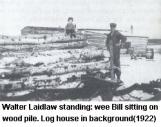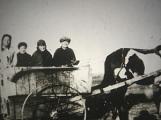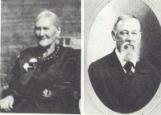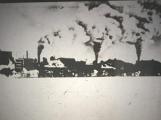6
Two days out from Emerson, near Winkler, a great storm swept across the land. The oxen and wagon stuck in the snowdrifts. Mother and the children climbed into the wagon box and father said, "I'll stay out and see what happens. I can stay here till morning". We were almost dead from exposure when we saw an elderly Mennonite coming through the blizzard beckoning with his hand and saying, "Follow me". He led us through the blinding snow to a Mennonite settlement and a house and barn under one roof. In the room was a stove with a big iron plate which was always hot, for the Mennonites burned manure for fuel. How warm and cozy were our beds on the floor. They charged us "five cents a slope (sleep)" and fed us well. All my life I have loved the Mennonites for saving our lives that night in the storm.8
We knew that a settler was living at Badger Creek.so James and I would run along the trail looking for signs of human habitation. At last James came racing back to the wagon shouting excitedly, "I saw a stovepipe with smoke coming out!" In this house lived Preston, a land agent, with three little girls who sang for us. Next day we had dinner with John P. McKibbin, and reached the Sutherland house. where we stayed till May 25th. We chose a claim on the Long River about six miles north-west of Cartwright, near where Hazeldell School (now dissolved) was built. The reason we chose this site was that it was sheltered and had been previously occupied by Indians. Henry walked to Deloraine with ten dollars to file our claim at the Land Titles Office. The land was rich and covered with thick shrub. We saved ten pounds of potatoes and planted the eyes in the bush, and in the fall harvested 300 pounds of potatoes. We planted parsnips and the next year rhubarb and asparagus, which were still thriving after 98 years. With the plow we had bought for twenty-one dollars, we broke five acres for oats. The oxen were so tired the last round they would not go another step.10
We cut down trees along the river, squared the logs and built a house 14 by 16 feet, where we lived for two years. We pressed clay and grass between the logs, spread saplings for the roof which we covered with hay, then with clay and we had a warm ceiling. There was only one window in the house, which faced east. We had no chairs, only a bench behind the table. By the second year we built a comfortable, warm house.12
That first summer we caught a great quantity of fish in the creek. The first 21 shots I fired, I killed 21 prairie chickens. We had no cow until fall, when Henry brought two cows from Emerson. We had bought a Dutch oven for a couple of dollars to cook bread. After the first year when we had learned to fish in the river, to gather duck eggs and eat them, and to trap and shoot animals, we were never hungry again.What poor clothes we had! Mother made them all, even our boots. We children went barefoot all summer. Mother had a spinning wheel and we all spun. We would go to Clearwater and buy two or three fleeces of wool and then we would card and spin it. Poor Mother. Once she was cutting out a pair of pants on the table with her scissors, and she cut her only tablecloth into a pair of trousers.
14
Once James and I went to Mooneys to visit, and James had to keep his face to the crowd, for behind he was bare naked. For a time Mother was the only white woman between Crystal City and Wakopa, 21 miles on one side, 24 miles on the other. Mother was boss and we all did what we were told - indeed she was the only man amongst us.One day the first summer Mother sent me five miles across the prairie to our nearest neighbour to borrow a cup of salt. We had to haul our grist by oxen to Souris or Wakopa. One day I was drawing a load of potatoes to Arthur Rollins' Store at Killarney, we were crossing a river and the oxen had pulled themselves up on the other bank, when the current caught the load, turned over the wagon, and five bags of potatoes and five bags of flour washed down the creek.






